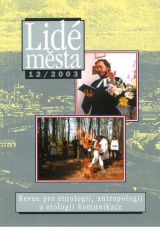Specifika v religiozitě protestantských reemigrantů z Volyně
DOI:
https://doi.org/10.14712/12128112.4333Abstrakt
During their 75-year stay in Volhynia, Czechs appropriated many specific cultural habits and traditions, which they brought along with them when they returned to Bohemia after World War Two. In the course of integration into Czech society, they gradually abandoned them or they tried to integrate them into the new life conditions. Strong inertia appeared especially in the religious sphere, where some specific features following up the Volhynia religious traditions are visible till now. The Czech Brethren's evangelical congregation in Chotiněves in the Litoměřice region was created in 1948 by re-settlers from Boratín in Volhynia at the head with their minister in order to directly follow up the work of the Boratín reformed congregation. As a result, one can trace in the religious feeling of this congregation, formed by re-settlers, some elements distinguishing them from the majority of church-goers from the Czech Brethren church. At first sight, there is an obvious large stress on the role of choral singing. Singing was a vital part of external religious activity already in Volhynia, where it was among the important elements of evangelising work in the inter-war era. Re-settlers have retained a special liking for singing until present and they even now meet, though not regularly, to train singing. The erstwhile wide repertory of songs has much narrowed, but the songs sung at Volhynia are still the most favourite ones. There is another specific feature: the independence displayed by the lay members of the Chotiněves congregation from the very beginning. They did not rely on church, but mostly tried to settle alone most of the affairs - the budget of the congregation, search for clergymen, etc. The entire religious attitude of re-settlers is closely connected with the agricultural way of life in Volhynia. The Thanksgiving ceremony is until present one of the most important events of the year. The relationship to the Bible as a book of eternal truths and related rejection of any critical examination of the text has only slowly changed after they returned to Bohemia. However, it gradually lost its acute form and at present a critical reflection of the Gospel is no longer seen negatively by the re-settlers. Similarly, there was a deep respect for the Eucharist, connected with an ernphasis on ethical purity of those who receive Holy Communion. The voices of some re-settlers, asking for a smaller frequency of Holy Communion, justified with a fear that the act could become banal, appeared as recently as the 1990s, when the congregation's elders agreed with the decision to hold the Eucharist every month. Same specific features of the religious practice, originating in Volhynia, have thus been retained to a large extent by the generations of re-settlers until now. However, the descendants of the re-settlers, who are growing up in Bohemia, have not identified with these manners and along with the death of the last re-settlers, these features will undoubtedly vanish.
Stahování
Publikováno
Jak citovat
Číslo
Sekce
Licence

Tato práce je licencována pod Mezinárodní licencí Creative Commons Attribution-NonCommercial-NoDerivatives 4.0.


